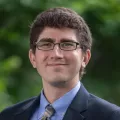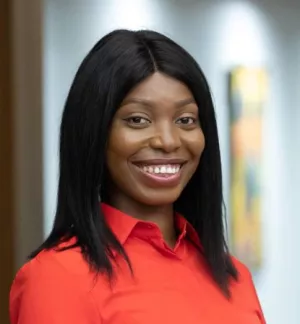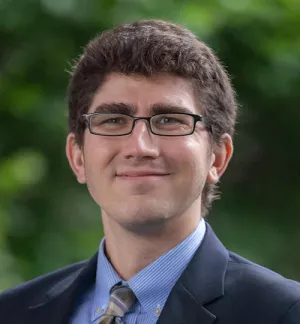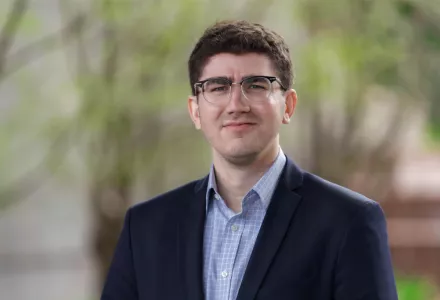
Evan Sankey’s major responsibility as a Belfer Center Research Associate is to lead a team of six researchers who work with Professor of Government Graham Allison, Director of the Avoiding Great Power War and Applied History projects. Having a deep knowledge of history and current international affairs is a crucial underpinning for Sankey’s work.
“I had a couple of history teachers in high school who were very enthusiastic about history,” Sankey says. “I was not that great a high school student, but I looked forward to history class and became very interested in American and European history.”
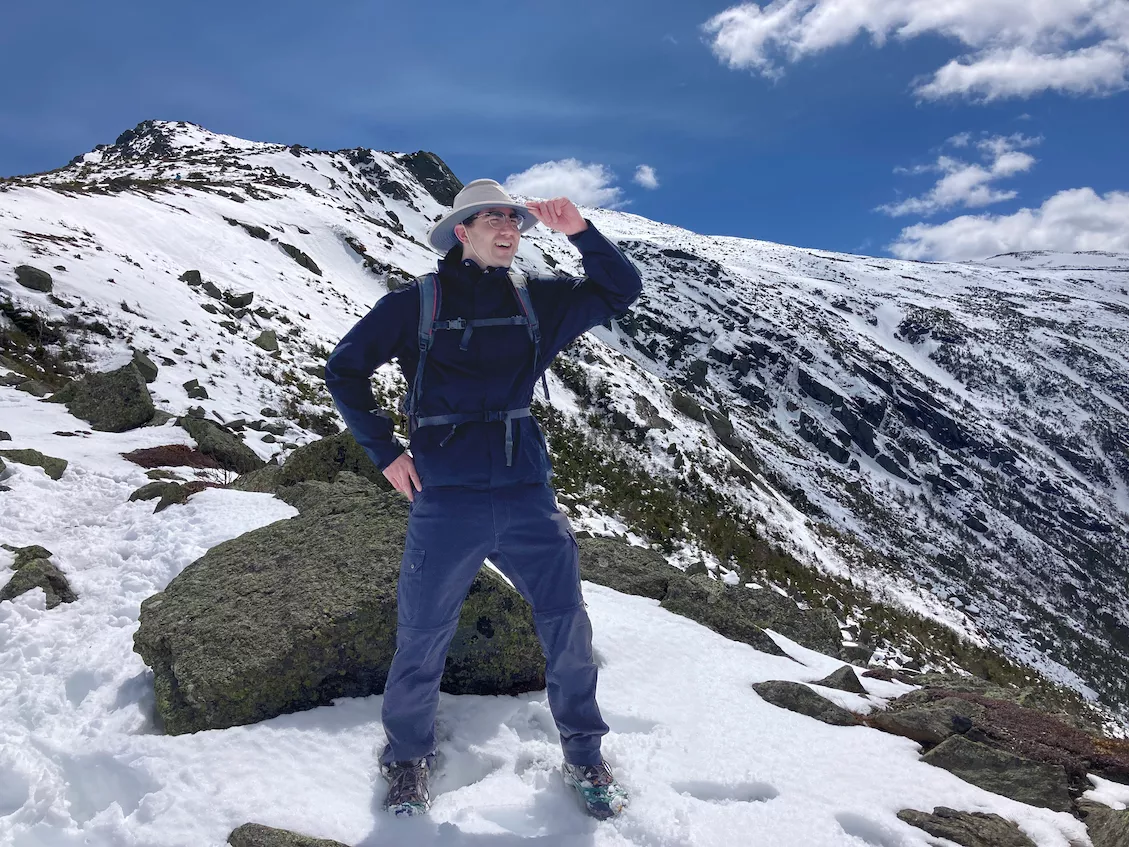
Evan Sankey and his younger sister grew up in Acton, Massachusetts, a small town west of Boston. “I had a great childhood. The things I enjoyed most usually involved spending time outside. My parents were very enthusiastic about going camping and hiking.”
In history class, his favorite era was the Napoleonic French Revolution of the late 18th and early 19th century. “Since I was interested in European history, I thought about being a diplomat or some sort of political leader. And although I didn’t study engineering, I’m also interested in tech and … in the space industry.”
When it was time for him to choose an area of study and college, he chose economics at Northeastern. “I really enjoyed the rigor, how economics gives you an intellectual toolkit for thinking about scarcity and incentives and trade-offs,” he said, adding, “I adopted the useful intellectual framework from economics that continues to benefit me today.”
He started thinking about international relations as a career after a six-month study abroad trip in Japan. “Japan is one of the countries I would say is most unlike the United States. It’s very clean, it’s very safe, and the demands on your language ability are very high. In order to get along in Japan, you’ve got to learn Japanese to some degree. It was really beautiful. And I got to travel, take classes at a university in Tokyo, and go hiking.”
Sankey’s visit to American military bases in Japan sparked an increased interest in U.S.-Japan relations. “When I started thinking about grad school, I chose that as a path,” he said. As a graduate student at Johns Hopkins’ School of Advanced International Studies, he concentrated on Japan, and following graduation, worked for a university-affiliated think tank on U.S.-Japan issues.”
The Belfer Center got on Sankey’s radar while he was in graduate school. “I spent a lot of time in grad school reading journal articles from International Security, run by the ISP program, so I knew of the Belfer Center’s reputation,” he said.
While working at the think tank in D.C., Sankey drafted a personal paper about spheres of influence in American foreign policy. “The point I was making is that spheres of influence are natural, they exist regardless of whether the U.S. wants to face up to that or not,” he said.
At the same time, he was looking for a job that would bring him back to Massachusetts. Seeing a job opening for a research assistant with Graham Allison’s team at the Belfer Center, Sankey applied and included his paper. “It just so happened that Professor Allison was working on a paper about the same topic at the same time, which I didn't know. That's how I got on his radar,” he said.
The pandemic resulted in a hiring freeze and his application process stopped. In summer 2021 he was in Virginia looking for an apartment when he got a call from someone on Allison’s team. “He wanted to know if I wanted the team manager job, which was different than the job I applied for. It was a more senior role. I thought, well, this is too good to be true. Ultimately, I said yes.”
As the chief of Professor Allison's research staff, Sankey supervises six research assistants in drafting written publications, responding to short-term assignments, prepping for media engagements and meetings, and promoting research to media and government stakeholders.
“The most fulfilling aspect of my job is the opportunity to supervise six smart young people. It's a hard job. It's the most demanding thing I've ever done especially since right above me is a very demanding boss. Graham has a deserved reputation as a doer and a builder. And that means he has very high expectations. It is a tough job to meet his expectations and to meet the expectations also of the team. But that's the most fulfilling part.”
Recently the team helped organize a major conference on the Cuban Missile Crisis 60th anniversary in collaboration with the Project on Managing the Atom. That anniversary was special, he said, “because it coincided with the Russian invasion of Ukraine. The presence of Russia's nuclear arsenal has injected nuclear weapons into the dynamics in a way that we have not seen since the Cuban Missile Crisis. So, a lot of people at Harvard and elsewhere have invoked the Cuban Missile Crisis as a source of lessons for how to deal with the war in Ukraine.”
He is excited about an upcoming conference on how lessons from the past can help us think about nuclear deterrence today. “One of our key propositions on this team is that history, especially the history of great power politics, can be mined for lessons and rigorously applied to clarify modern policy challenges. This conference will look back at the history of nuclear arms control, and nuclear negotiations, especially with unsavory regimes, to try to see what lessons there are for today,” he said.
When he’s not at work, Sankey spends time bike riding and hiking. “During COVID I built my own bike, and when the weather is warmer, I like to go hiking in New Hampshire. That’s one of the reasons I wanted to move back to Massachusetts - the hiking in New Hampshire and Maine is so good,” he said.
His love for history shows up in his leisure reading as well as work. “Unfortunately, I’m a non-fiction guy,” he laughs. His favorite nonfiction author is Edmond Morris, whose work includes a three-volume biography of Theodore Roosevelt. “The writing in that biography is the best I’ve ever read. It’s so good, it’s like reading a movie,” he said, adding, “But yeah, I should branch out beyond history.”
He has these nuggets of advice for colleagues: Keep on learning from your immediate colleagues and from people on other teams; Harvard is a gigantic universe and it is important to reach out across that world and meet other people; and be humble about what you don’t know.
He acknowledges Simone O’Hanlon, Graham Allison’s Executive Assistant, as one person he wants to thank. “She is the nerve center of the Avoiding Great Power War project. She works very hard and she’s very good at her job. She was definitely an extremely valuable person to get to know and work with effectively early on,” he said. He also gave credit to the person who called him that summer to bring him on to Graham’s team, Jesse Cameron. “He was very patient in onboarding and just incredibly kind and gracious in integrating me into the team,” he said.
Evan wants his career to focus on improving U.S. foreign policy. “U.S. foreign policy has a lot of problems – there are policies we continue to do where the costs are growing and the benefits are not growing,” he said. “Five years from now, if I’ve done something to improve the performance of U.S. foreign policy, where the performance is defined as preserving the interests of the American people, then that will be a good thing.”
FEATURED IN THE SPRING 2023 NEWSLETTER
Ezeokoli, Ada. "Research Associate EVAN SANKEY's Love of History Underscores Foreign Policy Insights." Belfer Center Newsletter, Belfer Center for Science and International Affairs, Harvard Kennedy School. (Spring 2023)


